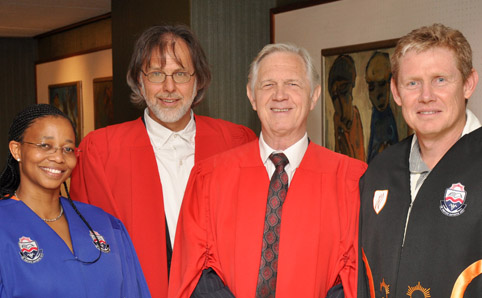Latest News Archive
Please select Category, Year, and then Month to display items
14 June 2024
|
Story Anthony Mthembu
|
Photo Suplied
 Jeremiah Hlahla, a UFS student completing his PhD in Botany at the University of Debrecen as part of an exchange initiative funded by the Erasmus+ Mobility Programme.
Jeremiah Hlahla, a UFS student completing his PhD in Botany at the University of Debrecen as part of an exchange initiative funded by the Erasmus+ Mobility Programme.
As part of an exchange initiative facilitated by the Erasmus+ Mobility Programme, Jeremiah Hlahla, a student at the University of the Free State (UFS), is nearing the completion of his PhD studies at the University of Debrecen in Hungary. Hlahla’s journey, which began in February 2024 and is set to conclude in July 2024, has been a remarkable learning opportunity. “As a first time-traveller to Europe, I have thoroughly enjoyed engaging with people from different countries and cultures,” he said.
The benefits of international collaboration
Hlahla is currently pursuing a PhD in Botany, focusing on plant stress physiology. “My current PhD project investigates the physiological, biochemical and morphological responses of vegetable-type soybean, or edamame, to combined drought and heat stress,’’ he explained. He considers the University of Debrecen the ideal institution to complete his research due to its extensive expertise and resources in similar projects. He noted that his colleagues at Debrecen conduct significant work on plant protection against biotic and abiotic stresses, including salt and drought stress, as well as proteins and amino acids in barley and other legumes.
Given the vast knowledge available on similar projects, Hlahla has found substantial engagement with his work at the University of Debrecen. “Upon arrival, I delivered an introductory lecture presenting my UFS project on the synergistic effects of combined drought and heat stress on the physiology and biochemistry of edamame. It was an engaging session as everyone could relate to my work and asked many questions,’’ he said.
Insights gained from the exchange
Hlahla has also gained valuable lessons that will assist him in his research career, including biotechnology and physiology tools. “I learned how to prepare samples and use high-performance liquid chromatography (HPLC) and reversed-phase ultra-high-performance liquid chromatography (UHPLC) to quantify proteins and amino acids,’’ he said. These techniques are beneficial not only for his current work but will also support future soybean research.
As his experience at the University of Debrecen nears its end, Hlahla reflects on the collaborations and friendships he has formed, which stand out as a significant highlight.
Professor suggests San place-name book
2011-09-28
|

|
At the inaugural lecture of Prof. Raper were, from left to right: Dr Choice Makhetha, Vice-Rector: External Relations (actg); Prof. Theo du Plessis, head of our Department of Language Management and Language Practice; Prof. Raper; and Prof. Lucius Botes, Dean of our Faculty of Humanities.
Photo: Stephen Collett
|
Prof. Peter Raper, Honorary Professor: Linguistics, in the Department of Language Management and Language Practice at our university, delivered his inaugural lecture on Tuesday, 27 September 2011. Prof. Raper focused on the topic of “Interpretations and translations of Bushman (San) place names” and he recommended the establishment of a chair for Khoikhoi and Bushman name studies at the UFS. Prof. Raper said that, until about 2 000 years ago, the Bushmen and their ancestors were the only inhabitants of southern Africa and that, presumably, all place names in the region were of Bushman origin. Prof. Raper also suggested the publication of a dictionary of Bushman place names which will contribute to restoring and preserving Bushman toponymic, linguistic and cultural heritage.
In his inaugural lecture, Prof. Raper distinguished between the terms Bushman and San. He said “the term Bushman was for a long time considered an insult and San was preferred. Recently, Bushman became preferable and San is considered an insult”.